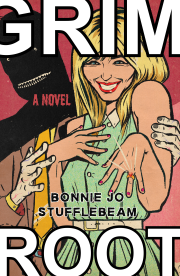Guest Blog Post: How Libraries Choose Books to Purchase
Posted by Victoria Strauss for Writer Beware
 A frequent question, especially among self- and small press-published authors, is how books get into libraries, and what authors can do to help. Today, guest blogger and public librarian Abigail Goben explains how libraries choose the books they purchase–and what authors should (and shouldn’t) do to play a part in that process.
A frequent question, especially among self- and small press-published authors, is how books get into libraries, and what authors can do to help. Today, guest blogger and public librarian Abigail Goben explains how libraries choose the books they purchase–and what authors should (and shouldn’t) do to play a part in that process.
——————————————
by Abigail Goben
One of the many hats of your public librarian is book purchasing. We are allocated a budget and spend a fair amount of time trying to build a collection that is well rounded, appeals to a wide variety of people, mixes great literature with popular novels, and will meet the needs of our community.
In this day and age of budget cuts and calls for fiscal responsibility, it is not only harder to get published, but harder to get published books into libraries. As we’re trimming ever shrinking budgets, we librarians need to be able to justify the materials that tax dollars are being spent on. Libraries don’t have the resources to buy mediocre books, where there is not the demand of a big author or a classroom’s worth of little girls asking for it.
Still, we’re trying to make as much as we can available. Here’s how I do it:
Where I find books:
- Professional Reviews: I spend time diligently going through Library Journal, Kirkus, Publisher’s Weekly, and other professional review journals. The majority of my selections come from there, and that’s probably what you’ll catch me perusing at the reference desk.
- Librarian Blogs: We’re a chatty bunch and love recommending things to each other. There are certainly better or worse blogs, but when it’s a review coming from someone whose blog I respect, I’m more inclined to consider a purchase. Librarians working with patrons every day know what goes well with their audience and what might go well with mine.
- Patron Requests: I’m fortunate enough to have a big enough budget that if a patron requests it, we can usually get it. I do verify that the requester belongs to my library system.
What sinks a book:
- A bad review followed by only ho hum reviews. If there is one bad review in four and the others are pretty positive, it stays on my list. If there is only one review and it’s bad, or the other reviews don’t make me believe–I’m not buying it.
- Bad cover art: Cover appeal is huge both with both children and adults. There is an extremely decorated and celebrated children’s author who prefers very stylized art on his covers. The majority of the kids I’ve attempted to booktalk/handsell it to didn’t like it, and so whether they were interested in the story or not, they didn’t take the book. You may not have a lot of input into your cover, but keep in mind that abstract doesn’t tend to go over well with the 12-and-under crowd, and that I, as a librarian, do consider cover art.
- Proclamations of the book being the next whatever–HP, Twilight, Grisham, Patterson, Kellerman…you name it, we’ve seen it.
What to do if you’re writing or have written a book:
- Ask for research help. Be clear that you’re writing a book and looking for sources. We’re here to help in person, by email or IM or phone, and increasingly by text message.
- Consider asking about a time where you could come in and meet with a librarian one-on-one. Your local public library may not have the staffing to do this, but it won’t hurt to ask, and it can provide an opportunity to work with a librarian without the pressure of someone breathing over your shoulder waiting for immediate assistance.
- Ask for suggestions of other things in your proposed genre to read. We are involved with these books on a daily basis, and chances are good we’ll have some ideas.
- Find out how you can partner with your library to make your book more available and sell copies. This could be a local author fair–with 5-10 local authors coming in to have their books on hand to discuss–or a book signing one afternoon in the lobby, or pairing for a program on your topic with books at the end. Libraries may or may not be able to pay you for your time and expenses.
What not to do:
- Don’t ask your librarian to edit your book. I might be willing to review a published book or an ARC for free on my own time, but I charge by the hour for editing.
- Don’t demand that we stock your book, give you a chance to do a lecture, host a program in your honor, buy fifteen copies, etc. You may suggest. We reserve the right to say no.
- Don’t treat us like your personal assistant. We’re here to help, but we have many other duties on our plates.
- Don’t offer a copy contingent on a positive review on the library blog or any bribery of that nature. We do like thank-you cookies, though.
- Don’t call repeatedly. I’d say “don’t call ever” but some people still take phone calls. I don’t. Mailed brochures get a cursory review. Email is probably the best way to reach me, but you should have a website in place before you reach out, and I shouldn’t be immediately able to tell that your family or students wrote the Amazon reviews. Don’t email everyone on the library staff–that just annoys us.
- Do not abuse the Patron Request. We’re sneaky and smart and networked. We’ll know and we’ll tell everyone we know. If you don’t believe me, you can find out about the efforts of one author here.
Let’s be realistic:
- It is extremely rare that I will purchase anything from a vanity press. It’s not impossible, but the items purchased tend to be of the local history, local celebrity nature rather than a pedantic children’s chapter book, poorly self-illustrated picture book, or a church collection of recipes.
- Everyone writes WWII books. Please, if you’re interested in writing historical fiction, choose another time period. I see an average of four “escaping the Nazis” books a month and while we certainly don’t discount Holocaust literature, there is so much more out there that would also benefit from time in the limelight, and it’s more likely to catch my eye for not being WWII.
Most public libraries will happily consider the donation of a copy of your book if it meets the criteria of their collection development policies. However, we are under no obligation to accept even a free copy just because you live down the street and got a vanity press to typeset it for you. We will also weed it if it doesn’t circulate. Public libraries are not, generally speaking, material repositories, and everything has to earn its shelf space.
Abigail Goben is a public librarian and freelance medical writer and editor and MS Access designer in La Crosse, Wisconsin. She blogs about her adventures with libraries and books at Hedgehog Librarian and about knitting and her extremely spoiled cat at Hedgehog Knitting. She’s an active member of the Library Society of the World.


